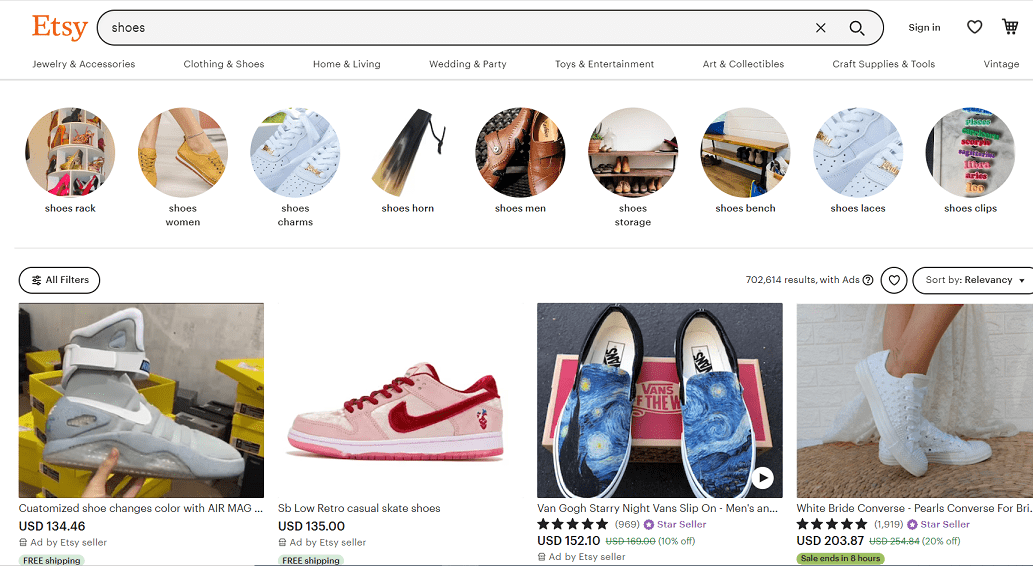Discover Top Shoe Brands and Styles at Pandabuy Shoe Store
Discover Top Shoe Brands and Styles at Pandabuy Shoe Store
Blog Article
Top Fads in Shoes Ecommerce for 2024: What You Need to Know
As we come close to 2024, the landscape of footwear eCommerce is poised for considerable improvement, driven by ingenious fads that promise to improve customer interactions and purchasing habits. Key developments such as AI customization, sustainability initiatives, and the rise of social commerce are readied to redefine how brand names connect with their target market. Developments like online try-ons and membership versions will better improve the shopping experience. Understanding these fads is essential for any kind of industry stakeholder looking to remain affordable in a rapidly developing industry. What effects do these shifts hold for the future of shoes retail?
Surge of AI Customization
The surge of AI customization in the footwear eCommerce field is improving the method consumers engage with brand names. As retailers leverage progressed algorithms and artificial intelligence, they can now customize the buying experience to specific choices, enhancing consumer satisfaction and loyalty. Via data evaluation, AI systems recognize patterns in consumer habits, enabling brands to provide tailored product suggestions, promotions, and material.
For example, dynamic item display screens adjust in real-time based on customer communication, guaranteeing that consumers exist snappy that resonate with their tastes. This degree of modification not just boosts the purchasing experience however likewise drives conversion prices, as consumers are most likely to buy products that line up with their preferences.
Additionally, AI-driven chatbots offer customized assistance, directing buyers via the purchasing process and addressing questions in a timely way. This improved interaction cultivates a much deeper connection between brands and consumers. As eCommerce remains to evolve, the assimilation of AI personalization will be pivotal in identifying effective shoe retailers from their rivals, permitting them to produce special, appealing experiences that reverberate with the modern-day consumer. Embracing this trend is necessary for brand names aiming to flourish in the affordable landscape of 2024 and beyond.

Sustainability in Shoes
Emphasizing sustainability in footwear has actually ended up being a critical focus for brands as consumers significantly focus on green methods. Brands are currently making use of recycled materials, such as plastic and rubber, to produce long lasting and elegant footwear.
Additionally, firms are implementing cutting-edge manufacturing techniques that reduce carbon footprints. 3D printing and automated manufacturing processes minimize material waste and power consumption. Additionally, many brands are devoting to honest labor practices, making sure reasonable earnings and secure working conditions for their employees, which reverberates strongly with today's socially mindful customers.
To boost sustainability efforts, brands are additionally focusing on the idea of circularity. This consists of take-back programs that encourage customers to return old shoes for refurbishing or recycling, thereby extending item life and minimizing landfill waste. As the need for sustainable footwear remains to climb, firms that focus on green practices will likely acquire an affordable side in the market, fostering brand loyalty and drawing in new clients devoted to sustainability.
Development of Social Business
Profiting from the increase of social media systems, brand names are significantly integrating social commerce into their sales techniques, recognizing its possible to engage customers directly. This trend has actually changed exactly how customers find and purchase footwear, with systems like Instagram, TikTok, and Facebook evolving into essential sales channels.
Brand names are leveraging shoppable posts, live streaming occasions, and influencer collaborations to produce immersive shopping experiences that reverberate with their target audience. By using aesthetically appealing content and authentic narration, footwear brand names can effectively showcase their items and cultivate a sense of community amongst consumers.
In addition, the usage of user-generated web content has actually ended up being crucial in building trust fund and trustworthiness. Customers are most likely to buy shoes when they see real people making use of and endorsing the items. This organic type of advertising and marketing not only enhances brand name loyalty yet additionally drives conversions.
As the landscape continues to evolve, footwear brands must continue to be agile, adjusting to the most recent social business functions while assessing consumer behavior to optimize navigate here their strategies. By embracing this development, brands can capture the focus of a wider audience, eventually driving sales and boosting customer involvement in the affordable e-commerce market.
Digital Try-Ons and AR
Changing the online shopping experience, digital try-ons and augmented reality (AR) innovations are becoming important devices for shoe brands in 2024. These developments permit consumers to imagine just how shoes will certainly look and fit prior to buying, dealing with among one of the most considerable discomfort points in online buying: uncertainty about fit and style.
By leveraging AR, consumers can utilize their smartphones or devices to see a realistic overlay of shoes on their feet. This immersive experience not only enhances involvement however additionally dramatically reduces return rates, as customers are extra positive in their choices. With the growing class of AR modern technology, footwear brands can produce customized experiences, allowing users to customize shades, patterns, and designs in real time.
Moreover, digital try-ons are being integrated into social networks systems, making it easier for customers to share their footwear options with pals and look for viewpoints. As consumers progressively anticipate interactive and customized shopping experiences, shoe brands that embrace digital try-on innovation will gain an affordable edge. Eventually, the integration of AR in ecommerce is not just a fad; it is ending up being a critical component of the client journey in the shoes market.
Membership Designs and Providers

These membership services typically include individualized tests that examine specific style preferences, dimensions, and requires, making sure that customers get alternatives that resonate with their tastes. In addition, lots of brand names offer adaptable terms, permitting customers to stop or terminate registrations easily, additional boosting client satisfaction.
In addition, subscription versions can help reduce the decision-making worry connected with purchasing for shoes, as consumers are offered with a choice that aligns with their choices. This approach not just cultivates brand name commitment however likewise urges repeat acquisitions, as consumers are more probable to involve with brand names that provide comfort and customized service.
As ecommerce proceeds to evolve, the assimilation of membership services in footwear retail stands apart as a strategic action. It properly fulfills the needs of modern-day customers while driving continual profits growth for brand names in a competitive marketplace.
Verdict
The developing landscape of footwear eCommerce in 2024 underscores the relevance of AI personalization, sustainability efforts, and social commerce as critical patterns shaping consumer index experiences. As brand names significantly embrace view sophisticated technologies such as digital try-ons and subscription models, the focus on improving client engagement becomes critical. These developments not only show transforming customer choices but also indicate a wider change in the direction of a more interactive, accountable, and individualized buying environment within the shoes market.
The rise of AI personalization in the footwear eCommerce industry is improving the way customers involve with brands. With information evaluation, AI systems identify patterns in consumer habits, enabling brand names to offer customized item suggestions, promotions, and content.
Highlighting sustainability in footwear has actually become an important focus for brand names as consumers progressively prioritize green practices. Several brands are committing to moral labor techniques, making certain fair salaries and safe working conditions for their workers, which resonates strongly with today's socially mindful customers.
As consumers increasingly anticipate tailored and interactive buying experiences, shoe brand names that embrace virtual try-on modern technology will certainly acquire a competitive edge. pandabuy.
Report this page